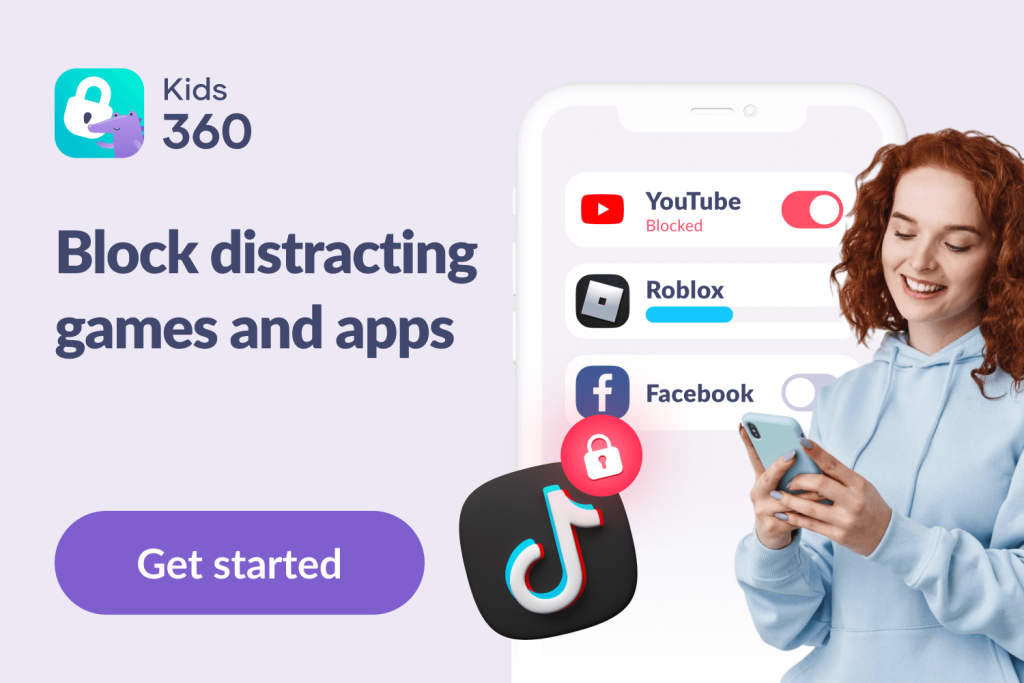Gaming Addiction in Kids and Teens: Recognize the Signs and Find Treatment

Video game addiction is a growing concern amongst parents of children and teenagers who rely on playing digital games as a way to relax or feel happiness. As a parent, knowing the symptoms and long-term effects of video game addiction, along with limiting screen time, can help your child’s cognitive and behavioral development to set them up for success in the future.
In this article, we’ll discuss video game addiction, what to look for, and how to overcome and prevent it.
Contents:
- What is Video Game Addiction?
- Who Does Video Game Addiction Affect the Most?
- How Do Video Games Affect the Brain?
- Causes and Risk Factors for Video Game Addiction
- When is Gaming a Mental Health Problem?
- How is Video Game Addiction Diagnosed?
- How is Video Game Addiction Treated?
- What to Do with Video Game Addiction and Prevention Tips
- FAQs
What is Video Game Addiction?
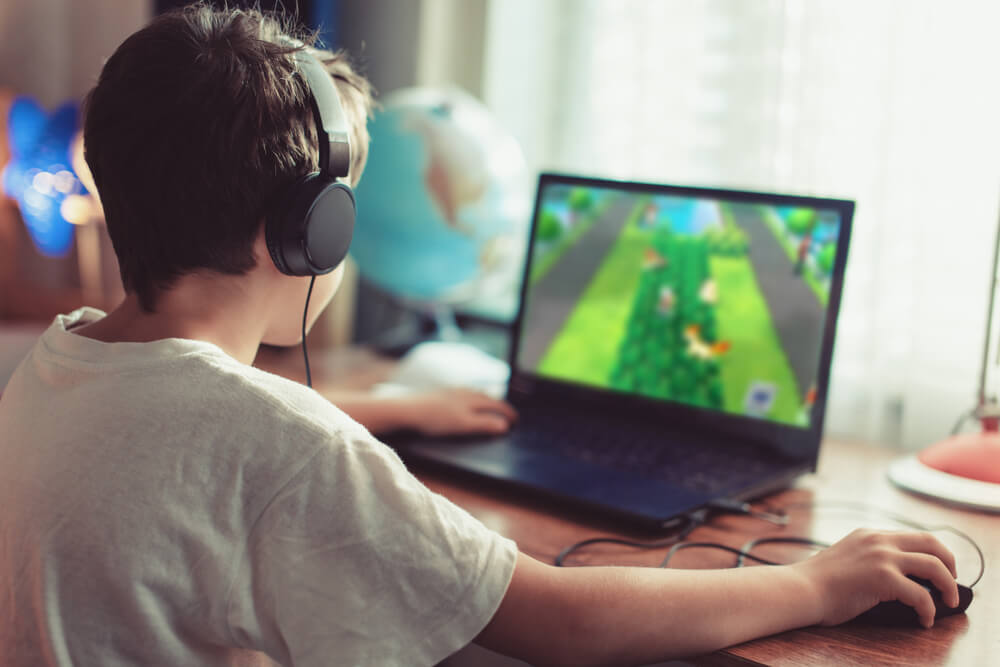
sakkmesterke/Shutterstock.com
Video game addiction, clinically referred to as internet gaming disorder, is the uncontrollable urge to play video games, even when it starts to have negative impacts on your life.
This condition is marked by an obsessive focus on gaming, often substituting real-life activities such as socializing, completing homework, or attending to job duties. The consequences can be significant, affecting personal life, social interactions, and physical health.
Symptoms may include being unable to limit game time, experiencing withdrawal symptoms when not playing, and the need to spend increasingly longer periods gaming to feel the same pleasure.
This disorder affects both kids and adults, influencing their mental and physical well-being as well as brain chemistry. Repetitive gaming behavior can alter brain activity, similar to the effects of addictive substances, making it harder to enjoy activities that once brought pleasure. Identifying these signs early is key to seeking the right help and preventing long-term issues.
The Debate Over Video Game Addiction: Is It a Real Disease?

InFocus.ee/Shutterstock.com
Experts disagree on whether video game addiction is a real disease. Some organizations, like the American Psychiatric Association and the World Health Organization, think it can cause serious problems and have included it in their diagnostic manual, DSM-5.
Some researchers say it is a true disorder, similar to substance addiction, with compulsive gaming and negative impacts on daily life. Others believe it is just a sign of other issues, like anxiety or depression in youth and adults.
No matter the viewpoint, the potential harm and need for professional help highlight its seriousness.
Is Gaming Disorder the Same as Gaming Addiction?
People often use the terms “gaming disorder” and “gaming addiction” to mean the same thing, but they are slightly different.
Gaming disorder is officially recognized and involves a pattern of gaming that seriously harms a person’s life.
Gaming addiction is a broader term used to describe compulsive gaming with similar symptoms, but it doesn’t always meet the strict medical criteria.
Both affect brain function and behavior. However, gaming disorder is a clinical diagnosis, while gaming addiction is a common way to describe the problem’s impact on daily life.
Who Does Video Game Addiction Affect the Most?
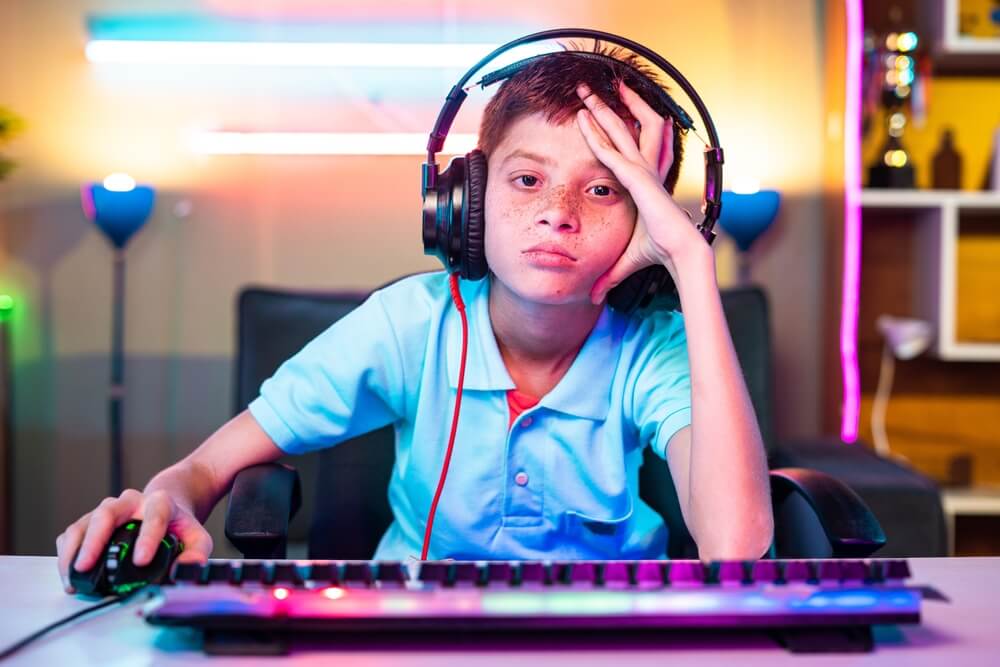
WESTOCK PRODUCTIONS/Shutterstock.com
Video game addiction can impact children, teenagers, and adults in many ways, affecting both their minds and bodies. For children, spending too much time gaming can slow down their social growth.
When kids spend too much time playing games, they miss out on real-life social interactions, which can make it difficult for them to develop communication skills and manage their emotions. This can lead to problems with schoolwork and making friends.
Teenagers, who are at a key stage of forming their identity and coping skills, may use video games to escape from real-life pressures. This escape can cause them to avoid important activities like studying, joining sports or clubs, or developing personal relationships.
Not having a balance of activities might hurt their personal growth and school performance. They might also show behavior issues like being more irritable or aggressive, especially when they can’t play games.
Adults can also be affected by video game addiction. It can interfere with their job responsibilities, leading to lower work performance and possibly losing their job. Relationships with family and friends can suffer because of the time spent gaming instead of connecting with loved ones.
Adults may also face health problems like bad posture, a sedentary lifestyle, and related issues such as obesity and cardiovascular issues.
However, teenagers are the most affected by video game addiction. During these important years, they often spend long hours playing games. While children and adults can get addicted too, teenagers show the highest rates of compulsive gaming and are more at risk for negative effects.
How Common is Video Game Addiction?
Studies suggest that video game addiction is a concern for a significant segment of the population. Approximately 60% of young Americans play video games every day and the average gamer plays more than six hours per week.
Of these gamers, one in ten of them will develop video game addiction. That means that 8.5% of US children and teens that play video games are addicted.
How Do Video Games Affect the Brain?

Green Elk/Shutterstock.com
When children play video games, their young brains can get very stimulated, which can cause problems with attention and focus. Children who play video games for more than 3 hours a day are more likely to develop symptoms of depression.
Teenagers might become very involved in gaming, sometimes using it to avoid important life tasks. This can lead to addictive behavior or changes in brain chemistry similar to those seen with drug addiction.
For adults, gaming can affect brain activity, making it harder to enjoy everyday things and carry out daily tasks.
People of all ages might lose out on social interactions and face other mental health issues.
On the flip side, playing video games in moderation may enhance cognitive skills, such as problem-solving and strategic thinking. Multiplayer games also offer opportunities for social interaction and cooperative teamwork, helping to build communication skills and friendships, especially in young gamers.
Why are Video Games So Addictive?

Krakenimages.com/Shutterstock.com
Video games grab players’ attention with interesting stories, quick rewards, and social interactions. They trigger the brain to release dopamine, a chemical that makes you feel good and accomplished. Games also help people escape reality and reduce stress.
The idea of “flow” keeps players very focused, making them lose track of time. Real-time feedback and random rewards, similar to gambling, make players want to keep playing for the next win.
These features together create a strong habit that can lead to long gaming sessions.
Causes and Risk Factors for Video Game Addiction
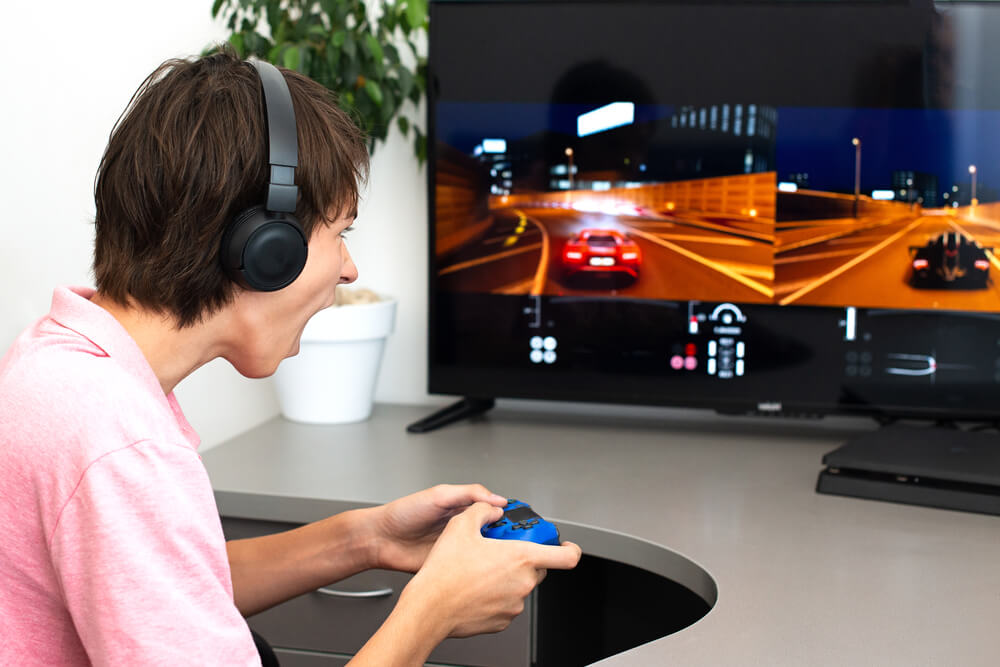
Irina Zharkova31/Shutterstock.com
Many factors can lead to video game addiction in different age groups. For kids, not having enough supervision from parents can cause them to play too much.
Teens might use video games to escape from real-world problems or social pressures. This age group is especially at risk because their brains are still developing, making them more likely to form addictive habits.
Adults can become addicted due to stress or wanting to escape from work or personal life problems.
For all ages, feeling isolated, having mental health issues like anxiety or depression, and not having other fun activities can increase the risk. Also, the design of video games, with their reward systems and social features, can make them very addictive.
When is Gaming a Mental Health Problem?

Drazen Zigic/Shutterstock.com
Gaming can become a mental health problem when it starts to interfere with daily life. This might look like constant thinking about gaming and neglecting responsibilities at school, work, or home.
You might see the person spending too much time playing and losing track of time, missing important events or deadlines. They might have sleep problems because they stay up late to keep playing.
Social interactions often decrease as they spend less time with family and friends, leading to damaged real-life relationships. Sometimes, people use gaming to escape reality, which can hide other mental health issues.
Physical health can also suffer due to less movement, bad posture, and not enough exercise, which can increase risks for conditions like obesity and type 2 diabetes.
Getting professional help is important if you notice these symptoms.
Signs of Video Game Addiction in Adults
Adults addicted to video games may show signs of withdrawal when they’re not playing and find it hard to cut back. They often become obsessed with gaming and might lie to family about how much time they spend playing.
This addiction can affect their job, social life, and relationships, causing conflicts and neglected duties. Many use gaming to escape from stress or anxiety.
How is Video Game Addiction Diagnosed?

VH-studio/Shutterstock.com
Diagnosing an addiction to video games means a doctor or mental health expert needs to take a close look at your child’s habits. They look for things like constantly thinking about games, feeling bad when not playing, and not stopping even when it causes problems. These signs should seriously affect their daily life for at least a year.
Professionals often use questionnaires and interviews to see how strong the addiction to gaming is.
How is Video Game Addiction Treated?
Early video game addiction treatment steps usually include teaching the child and their family about the issue and suggesting treatments like cognitive-behavioral therapy (CBT) to help control the addiction.
Other treatments for video game addictions include group therapy, where individuals share experiences and coping strategies, and family or marriage counseling, focusing on improving interpersonal relationships affected by gaming.
Professional help from programs like American Addiction Centers can be beneficial. For adolescents, specialized programs such as PIPATIC are tailored to their needs. A treatment process where parents are involved often show to be more effective.
What to Do with Video Game Addiction and Prevention Tips
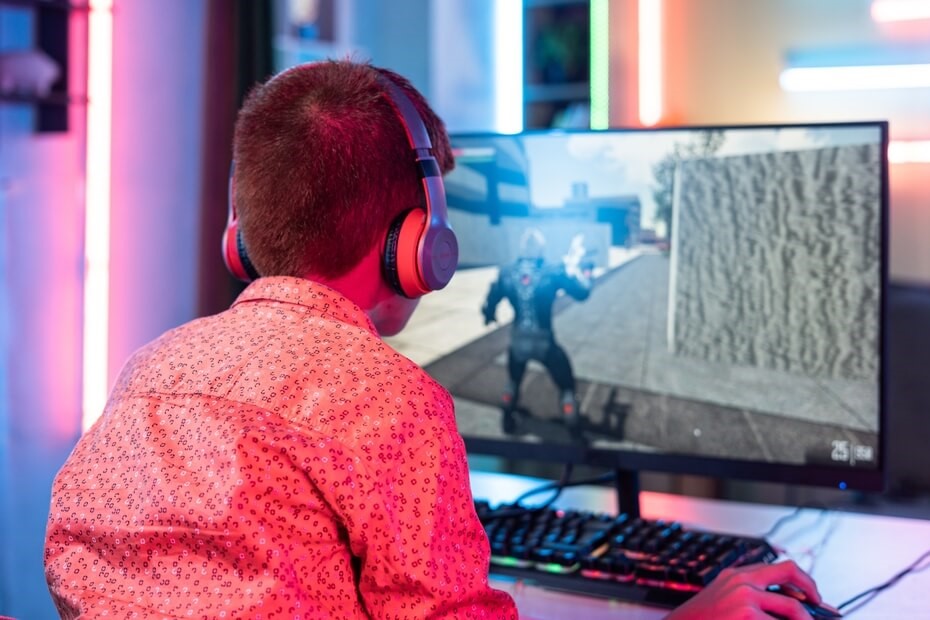
WESTOCK PRODUCTIONS/Shutterstock.com
Not every child or adult who plays video games will develop video game addiction. However, there are some things you can do to prevent video game addiction from developing and ways to cure it.
Video Game Addiction Tips for Adults
If you or someone you care about is struggling with video game addiction, there are several ways to help:
- Set Time Limits — Make a schedule for gaming and stick to it to keep a healthy balance.
- Remove Devices from Bedrooms — This helps improve sleep and reduces the temptation to play late at night.
- Engage in Other Activities — Try hobbies, sports, or exercise to shift focus away from gaming.
- Build a Support Network — Family and friends can help keep you accountable and encourage healthier interactions.
- Practice Mindfulness and Stress Management — Techniques like meditation can reduce the urge to escape into games.
- Seek Professional Help — A doctor or therapist can offer personalized guidance and therapies like Cognitive-behavioral therapy (CBT).
Dealing with gaming addiction takes effort, but with consistent steps, it can be managed effectively.
Video Game Addiction Tips for Parents
Helping your child manage video game addiction starts with open communication. Talk to your child about their gaming habits and share your concerns without blaming them. Set clear and consistent rules for screen time.
Utilizing apps like Kids360 can help monitor and limit screen time on their phone. This app not only allows you to set time limits, schedule breaks, and ensure that games are age-appropriate but also offers a range of features to encourage balanced digital habits. With Kids360 your child will be able to develop their abilities and learn to manage their time wisely. Additionally, physical activities are rewarded, encouraging an active lifestyle beyond screens.
Take control of your child’s screen time with Kids360—help them balance digital fun with healthy habits. Try Kids360 today and create a safer, more productive online experience for your family!
Encourage your child to try other activities like sports, reading, or any hobby that doesn’t involve screens. By finding new interests, they won’t rely on video games as much for entertainment.
Keep electronic devices, including gaming consoles, out of bedrooms to prevent late-night play without supervision.
If gaming is affecting your child’s schoolwork, social life, or mental health, seek professional help. A counselor or therapist can offer strategies and support for your whole family.
Early intervention is key to stopping further issues.
Addressing Video Game Addiction in Children and Adults
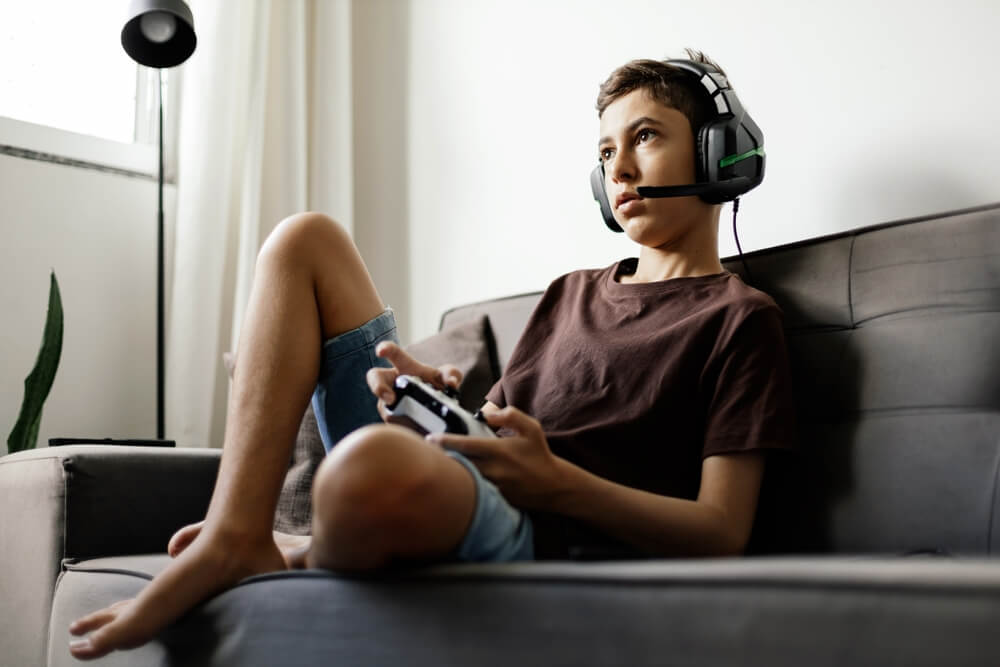
Kleber Cordeiro/Shutterstock.com
If you found this information helpful, consider sharing it with a friend or family member who might benefit from it.
Addressing video game addiction early on can significantly improve the well-being of both children and adults. If you learn to recognize the signs in yourself or your child, don’t hesitate to seek professional help.
Remember, being proactive about mental health can make a big difference. Together, we can help those affected by video game addiction lead healthier, happier lives.
FAQs
What is the root cause of gaming addiction?
The root cause of video game addiction often lies in the need to escape real life. The immersive experience of games can make people lose track of time and reality, making it hard to stop playing.
How many hours of gaming is considered an addiction?
Gamers who spend 21 hours or more playing video games each week can be considered addicted.
Is gaming a mental illness?
Video game addiction or gaming disorder is a mental illness and has been added to the DSM-5 as a diagnosable mental illness.
The picture on the front page: Stock-Asso/Shutterstock.com
Проверьте электронный ящик














